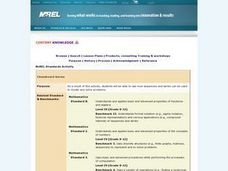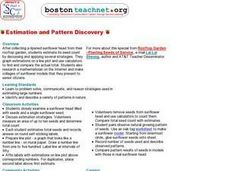Curated OER
Proportionality: Modeling the Future
Students explore and examine how patterns, measurement, ratios and proportions are utilized in the research development and production of airplanes. They meet a pilot from the Federal Aviation Association who describes the growth of air...
Curated OER
Modeling pentagrams using Geometers Sketchpad
Students using visual modeling software will construct two regular pentagrams which are mathematically similar. They also create a multi-page document and learn to create links between the pages and to a website on the History of...
Curated OER
How Many Cells Are Born in a Day?
Students predict the number of cells after a series of cell divisions. In this cells lesson students create a graph of their results and create a patterned drawing.
Curated OER
Chessboard Series
Students work together on a word problem. They write a written report of the answer. They participate in a chessgame in which the answers are used.
Curated OER
Building Patterns Incrementally
Students study the recurrence rules for patterns where the increase from one term to the next is not constant. They look for the recurrence rule on their own. They copy the pattern and create the next element, continue the pattern with...
Curated OER
Building Patterns Constantly
Students are introduced to some number patterns using buildings constructed with squares. They construct tables of patterns and finding the recurrence rule for a simple pattern where the increase from term to term is a constant.
Curated OER
Space Tiling with Captain Planet
Fifth graders Apply the symmetry and angle properties of polygons, using symmetry and angle properties of polygons to solve practical problems. They study tessellates and explain why a shape tessellates.
Curated OER
What's My Function?
Fifth graders utilize input/output tables to help them solve algebraic equations. They incorporate patterns, number sequences and relations to represent and analyze mathematical problems and number relationships using algebraic symbols.
Curated OER
Estimation and Pattern Discovery
Students collect sunflower heads from their community garden. They estimate its seed count using different strategies. They graph their estimations on a graph and use calculators to find the actual total.
Discovery Education
Discovery Education: Numbers in Nature
This Fibonacci sequence lesson plan is aimed at grades 9-12, but would be appropriate for some junior high classes. It includes historical background and examples of Fibonacci numbers in nature, as well as suggested readings and ties to...
Alabama Learning Exchange
Alex: Fibonacci Poetry
Students will review the Fibonacci sequence and compose poems with the number of syllables in each line corresponding to the the numbers of that sequence.This lesson plan was created as a result of the Girls Engaged in Math and Science...
National Council of Teachers of Mathematics
The Math Forum: Domino Activity
This Math Forum site has young scholars discover the the pattern of the Fibonacci Numbers by playing with dominos
Other popular searches
- Fibonacci Sequences
- Fibonacci Sequences and Art
- Free Fibonacci Sequences
- Fibonacci Sequences Draw
- Fibonacci Sequences Nature
- Fibonacci Sequences Art
- Fibonacci Sequences \
- Fibonacci Sequences in Art
- Fibonacci Sequences Rumors
- Fibonacci Sequences Music
- Fibonacci Sequences Rabbits
- Fibonacci Sequences %5C











